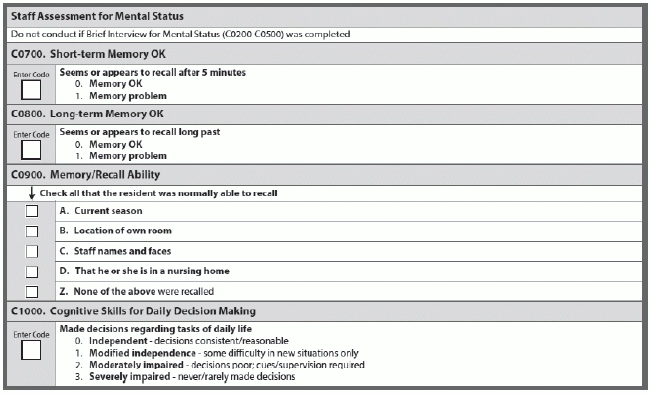Beware: Use staff assessment in only this situation.
When you’re performing the Staff Assessment of Mental Status Item (C0700 — C1000), it’s easy to get tripped up on certain areas of the assessment. Here are some important tips for coding this item correctly every time.
Tip #1: Don’t Skip the BIMS
Important: You should use the staff assessment only when you’re unable to complete the Brief Interview for Mental Status (BIMS). And you should make every effort to complete the BIMS, urged Karen Schoeneman, owner of Karen Schoeneman Consulting and recently retired technical director for the CMS Division of Nursing Homes, in a recent Centers for Medicare & Medicaid Services (CMS) instructional session. If the resident can interact with you in any way, shape or form, you should do the BIMS.
You can stop the interview after completing C0300C Day of the Week, if the responses meet certain criteria, nurse and MDS expert Judy Wilhide Brandt instructed in an article for Washington, D.C.-based Leading Age. Specifically, you can stop the interview at this point if you’ve received either nonsensical responses or no responses (written or verbal) for all questions.
Overall, the MDS 3.0 instructs you to deem the BIMS incomplete if the resident chose not to answer or gave nonsensical responses to four or more BIMS items.
Even when residents cannot complete the interview, “it’s important to do a staff assessment, because there are reasons other than severe cognitive impairment that they might not have been able to complete the interview, and you’re going to be observing their behaviors,” said Debra Saliba, MD, MPH, director of the UCLA/Jewish Home Borun Center for Gerontological Research in Los Angeles, in the same CMS instructional session.
Tip #2: Rely on Many Sources for Information
When you’re completing the staff assessment, you should rely on a variety of informational sources, Schoeneman noted. “And those can include observation of the resident across all shifts, certainly interviews with caregivers and direct care staff — again, across all shifts.” You can also interview family or significant others if the resident has them, “and then certainly we want to review the medical record.”
Crucial: You need to get a sense about how the resident is not just in your shift, but in various shifts, 24 hours a day during the observation period, Schoeneman stressed. “Staff members and others in close contact should also observe the resident’s cognitive functions in daily activities.” Ask direct care staff across all shifts questions like how the resident is doing in the dining room, or how is he doing in informal activities as well as formal or scheduled activities.
Tip #3: Take Your Time to Evaluate Long-Term Memory
Assessing C0800 (Long-Term Memory OK) doesn’t involve asking one or two simple questions — you need to sit with the resident and engage him in conversation, Schoeneman stated. “Maybe review photos, books, keepsakes or videos, or other memorabilia and observe the resident’s response to family who visit.”
You can ask a series of questions, such as: Are you married? What’s your spouse’s name? Do you have any children? What’s your birthdate? But make sure you ask questions for which you can validate the answers from reviewing the medical record or your general knowledge about the resident, Schoeneman urged.
Tip #4: Don’t Sweat the Exact Names for C0900
For items under C0900 (Memory/Recall Ability) you don’t necessarily need the resident to recall the correct names of everything. For example, regarding item C0900B (location of own room), the resident doesn’t really need to tell you that his room is Room 14, but he should know how to locate his room and walk you to it, Schoeneman said.
The same is true for C0900D (That he or she is in a nursing home). You can check this item if the resident understands he’s in a nursing home, even if he gives an incorrect name or doesn’t know the name of the nursing home, Schoeneman explained. And sometimes a resident might call a staff member by the wrong name, which is okay as long as he doesn’t call all staff members by that same wrong name (C0900C — Staff names and faces).
Tip #5: Stick with Small Decisions for C1000
Wrong way: C1000 (Cognitive Skills for Daily Decision Making) is another area staff may struggle with. Staff have difficulty with this item when they approach it as asking about making major life decisions, Schoeneman noted. “That’s not what this is about.”
Right way: “C1000 is about the resident making normal everyday decisions, such as choosing clothes, knowing when to go to meals, and using environmental clues to organize and plan his day,” explained Schoeneman. “They may look at the clock. They may look at calendars, posted event notices, things like that.”
Lesson learned: When doing the staff assessment, utilizing the many sources is crucial, and you also need to support this with documentation either by the persons observing the resident or your interviews of those staff members.

